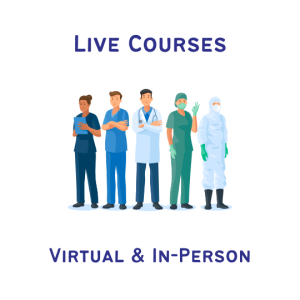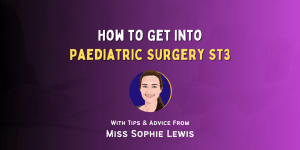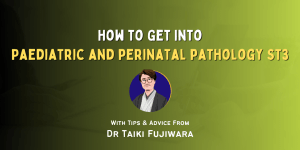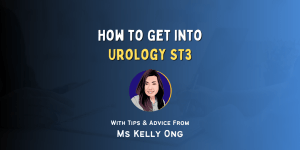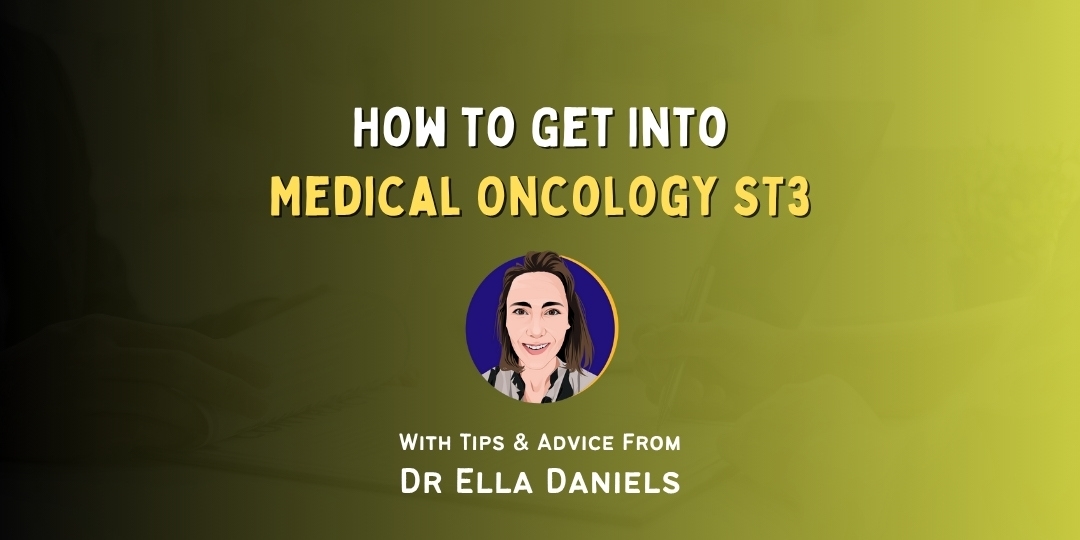
Published October 24, 2025 | Updated October 24, 2025
By MedCourse
Useful, relevant, and interesting content for UK Junior Doctors.
About the Author

Dr Ella Daniels, Medical Oncology Registrar, Bristol Haematology & Oncology Centre (Severn deanery)
My interest in medical oncology was sparked during CMT, and therefore, prior to registrar training, I worked in Australia as a medical oncology fellow on the Central Coast to gain experience and boost my application. I managed to squeeze in a few months of travelling as an added bonus!
In addition, I am on the Association of Cancer Physicians trainees committee, and I am currently undertaking an MSc in Genomic Medicine.
Courses & Conferences to Attend
- UK Oncology Forum
- Introductory medical statistics (Imperial)
- Building collaborations in global cancer care (Royal Society of Medicine)
- Molecular mechanisms of targeted cancer treatment (Royal Marsden)
The UK Oncology Forum is a free, two-day event usually in June that provides updates for a range of tumour sites. Any healthcare professional can register.
Good Clinical Practice (GCP) training is essential to maintain during medical oncology training. GCP is the international standard for undertaking clinical research. There are a variety of GCP introduction courses nationally, some virtual, that are often free. I did this prior to my application, and this helped demonstrate my commitment to speciality.
National Oncology Trainee Collaborative for Healthcare Research (NOTCH) hosts annual research symposiums open to core trainees as well as registrars. This is an excellent opportunity to hear about registrar-led research or even submit an abstract to present your own work. I presented a poster at NOTCH in ST3.
How to Maximise Your Portfolio
Look at the medical oncology application scoring matrix early, and use this to guide how to spend your time buffing your CV. Your QI, teaching, research and leadership experience does not need to be oncology-specific to score points, so use anything that fits the brief to score points. However, it is useful to have oncology-themed projects to demonstrate interest, insight and commitment to the speciality.
There is a huge variety of conferences that will accept posters and oral presentations regarding research, QI projects and clinical cases. Ensure you see things through to completion and speak to supervisors regarding opportunities to present your work locally, regionally and nationally. You may find that even a seemingly small project will still be an interesting presentation and may be accepted.
If you see an interesting case, talk to your registrars and consultants about writing up a case report and the best journal to submit to. It is difficult to score maximum points here as core trainees do not often have original research publications, but having a case report and a review article will still score well.
Explore funded opportunities for professional development. For example, the Genomics Education Programme offers funding for NHS professionals to complete modules towards a Master’s in genomic medicine, which is highly relevant to medical oncology. Don’t underestimate the amount of work a postgraduate qualification can take, and ensure you set aside adequate time for this.
Making the Most of Your Day Job
Express your interest in oncology to senior colleagues. They may assist with involving you in projects, improving your application and interview preparation. Many of us are involved with mentoring trainees interested in pursuing oncology.
A career in oncology requires excellent communication skills. Workplace-based assessments in any speciality, such as mini-CEXs, can help evidence your communication skills and provide feedback to discuss in your application to show how you meet the person specification.
Making the Most of Medical Oncology ST4 Placements
Get stuck in with managing acute oncological emergencies and revise local and national guidelines, as these often form the basis for the clinical scenario in the interview. Consider escalation status and remember the importance of communicating with both the patient and the family.
Please bear in mind that inpatient oncology can be very difficult, as patients often have advanced disease and complications from cancer or treatment, and you may be dealing with challenging situations, including death, very often. Try to find time to get to the clinic and see the breadth of what we do, including building longstanding relationships with patients, offering curative treatments and seeing clinically well patients thriving on treatment. It’s not all depressing, and our job is incredibly rewarding at times.
What About Non-Medical Oncology ST4 Placements?
Try to find ways to put an oncology spin on things. For example, during a respiratory rotation we had weekly peer-led teaching, and I delivered teaching on respiratory complications of cancer treatment (e.g immunotherapy-induced pneumonitis). As cancer affects every bodily system, you will often be dealing with patients with cancer on other rotations. Be creative and find ways to undertake cancer-themed projects or teach in other specialities.
A rotation in oncology is not essential to apply for medical oncology; however, I would recommend a taster week to get a sense of the speciality, confirm your interest and demonstrate commitment.


